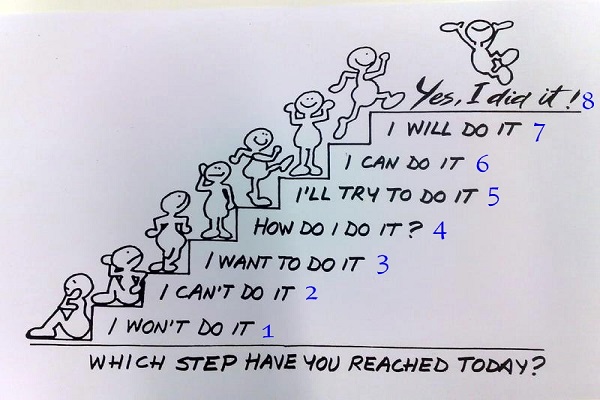TNS Experts
This post was submitted by a TNS experts. Check out our Contributor page for details about how you can share your ideas on digital marketing, SEO, social media, growth hacking and content marketing with our audience.
Do you have the right attitude as an entrepreneur to anchor your business startup? Here's a blog that provides some common denominators in terms of attitude that successful entrepreneurs should have to succeed in their maiden venture.
What makes a successful business? A lot would most probably say because of the CEO who set it up and the people he worked with. Now, if you’re thinking about starting your business but hesitant because you might not make it through the process or that you don’t have what it takes, don’t fret. I’m sure the most successful CEOs we have also doubted themselves at least once. However, it only takes the right attitudes to anchor your business startup.
We’ve all gone through the different phases when making big decisions in life. However, the very core of any decision is optimism. An entrepreneur should have faith in himself and everybody else who helps in establishing the company.

This attitude is particularly important in this age of digitization. Everything comes at a rather fast pace. You can come up with projections but it’s totally different when you’re bombarded by challenges while your business is only taking baby steps. Persistence and optimism go hand and hand. What you need is optimism in order to be resilient in whatever that would come your way.
Aggression in the sense that you got to do what you have to right here, right now. Collecting and compiling as much information and as many strategies you can get your hands on. This attitude is all about trying to be ahead in the race. Thus, you have no other backups but your promising team and strategies.

Startups are promising yet challenging because there are thousands of them in the country and all over the world. How then, can you stand out among the rest? Research is the best that you can do and not giving enough time for research could spell disaster for your company. Other startup entrepreneurs only value research at the beginning towards the middle of the process, then when the business is up and running tends to neglect further research.
Doing further research strengthens the business and the company. There’s a difference: strengthening your business to easily adapt to changes, discover more opportunities and eventually to expand to reach a wider prospect customers or clients. For the latter: you would definitely need your team no matter what. Research on what would alleviate their stress and address their needs as workers as a whole. Valuing them entails their giving you the respect and loyalty.
Being aggressive can take you a long way, but a solid team of workers and followers can take you farther. It’s high-j time that entrepreneurs should make their team as brand ambassadors and clients as collaborators. Start off with a realistic goal then devise a way – ideally with the team – to establish an appealing and desirable company culture, benefiting the clients, employees and ultimately, yourself.

At times, one has to listen to their gut instincts, and on other times listen to other people’s advice. If you’re really into a startup with a brand that uplifts a good workplace and business culture, you’d be sincerely putting a lot of effort in satisfying your team and clients. The thing about not feeling enough for your clients – that includes the workers – is that you’ll be viewed as someone who’s just after money and not reputation.
Two heads are better than one, they say, let alone multiple heads then that’s much better. Be transparent and involve your team as much as possible. Don’t hesitate to open up and ask for help. Trust them as you delegate tasks. Persuade them to strive for excellence. Empower them while you’re at it. Lastly, assure them that you’re serious about everything by showing them what a good leader looks like by being a good follower and role model.
The problem with consistency is that we often get inconsistent, and that’s a challenge any startup entrepreneur should overcome. This is one clear picture that you uplift your company’s brand, culture, and ethics from the beginning to the end.

I remember a time when I was offered the position as team leader in my previous company. My job was to supervise a number of people, making sure that they observe the rules and regulations, beat deadlines and deliver quality results and outputs. Those who have been under me would attest that I was strict, all because I’ve established a standard for them to live by. I push them to aim higher and get out of mediocrity. In my three to four years of leadership, I’ve had team members who were promoted to team leaders and are expected to deliver the same quality because they’ve all been under me.
Being consistent also shows that you adhere to the standards you’ve set, strive for excellence and that you mean business and you’re serious about being successful. The urge to slack could be strong, your drive for consistency should be stronger. Good thing it can be achieved by taking one step at a night, starting from the most important (client satisfaction, work ethics, innovation/creativity, etc.) to the last on your priority list.
Humility comes when you know you’re no better than anyone else. You respect your competitors more than hate them at some point. You ask countless advice. You embrace the fact that without your team, your friends and your family, you’re nothing. Startups teach us to rely on others as much as we rely on ourselves and thank them wholeheartedly for their service and support.
Another rewarding thing about startups is that it often compels us to do the “dirty work,” as what Zookal co-founder, Job Tse said. His journey is heartwarming and you can really sense the humility after going through a lot – just like any other entrepreneurs – of hardships.
He said in his article in Techinasia.com that they had to wear monkey suits to attract attention and personally deliver the goods to their customers around Sydney because no logistics company wanted to take them on. Now they have people to do that for them, but the first-hand experience of being on the ground is something he’ll surely treasure for the rest of his life.
Humility doesn’t equate to weakness. It’s actually a picture of strength as well. Admitting your mistakes and taking responsibility for it is also a manifestation of humility and strength. You’re ready to take on the consequences but the lessons out of them are gems.
You’d probably say these are not enough. However, I believe all other desirable traits spring out from these. When you have these core values, everything else follows. It takes bravery in making the first step. In the next phase, you’d need a positive mental attitude to get you through the whirlwind of wins and losses. And when the dust has settled and your startup getting stabilized, humble yourself as you move further in your startup journey.
AUTHOR’S BIO:
Abigail A. Sabijon is a full-time blogger and editor of Scoopfed.com and a contributor at panelwallart blog and a part-time team counselor, trainer and instructor. She has worked in an international institute and taught at a university. Now, she’s enjoying the company of her loving husband and beloved cats. Find her on twitter.
You’ll also receive some of our best posts today

This post was submitted by a TNS experts. Check out our Contributor page for details about how you can share your ideas on digital marketing, SEO, social media, growth hacking and content marketing with our audience.
Within a business, one of the most important factors...
Lead generation is all about attracting potential customers for...
When the first piece of electronic mail traveled from...


Your audience's attention is immensely valuable, but the challenge to ca...
Don’t miss the new articles!